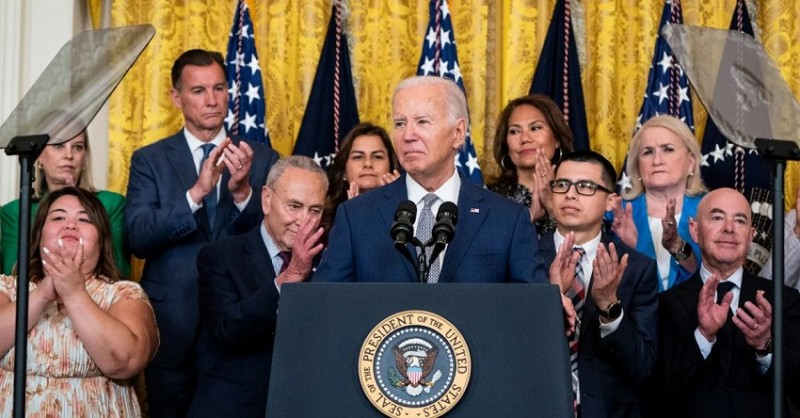
A Texas judge has temporarily paused a policy aimed at making it easier for spouses of U.S. citizens to obtain legal status in the country. This decision is seen as a setback to one of President Joe Biden's key immigration reform efforts.
On Monday, Judge J. Campbell Barker issued a 14-day administrative stay in response to a lawsuit filed by the Republican attorneys general of 16 states. These states are challenging the Biden administration's policy, which was introduced in June to provide a streamlined path to citizenship for approximately 500,000 immigrants married to U.S. citizens.
The states bringing the lawsuit argue that this policy is putting a strain on their budgets, particularly in areas such as healthcare, education, and law enforcement. Judge Barker acknowledged the significance of the claims, stating that they require further consideration beyond what the court has been able to provide so far.
Texas Attorney General Ken Paxton expressed his support for the ruling, stating, "This is just the first step. We will continue to fight for Texas, our country, and the rule of law."
Immigration has been a challenging issue for the Biden administration, especially as it remains a deeply divisive topic among Americans. With the upcoming presidential election in November, where Vice President Kamala Harris is set to face Republican candidate Donald Trump, immigration remains a central concern.
The Democratic Party is trying to strike a balance between being tough on illegal immigration while also reforming the nation’s outdated immigration system. Meanwhile, Trump has been vocal about what he describes as a migrant "invasion," making it a key point in his campaign.
The new immigration rules would have simplified the process for eligible individuals by removing the requirement for them to leave the U.S. as part of the application for permanent residence. These rules applied to immigrants who have been in the country for at least 10 years and were married to a U.S. citizen before June 17, 2024. An additional 50,000 stepchildren of U.S. citizens were also included under these guidelines.
Those who qualified would have received work authorization and the right to remain in the U.S. for up to three years while their green card applications were processed—a key step toward full citizenship.
Although Monday's ruling halts the immediate approval of this "parole in place" status, the Department of Homeland Security can still accept applications during this period. Judge Barker clarified that the court has not yet made any final decisions regarding the merits of the plaintiffs' case.
An expedited hearing has been scheduled, and while the initial stay is for two weeks, Barker suggested it may be extended as proceedings continue. The judge indicated that the administrative stay could remain in place until mid-October.
China Expresses Concern Over U.S. Nuclear Strategy Targeting Its Arsenal
Kamala Harris Delivers Powerful Speech at Democratic National Convention, Thanks Joe Biden
Trump and Harris Clash Over Debate Microphone Rules Ahead of September Showdown